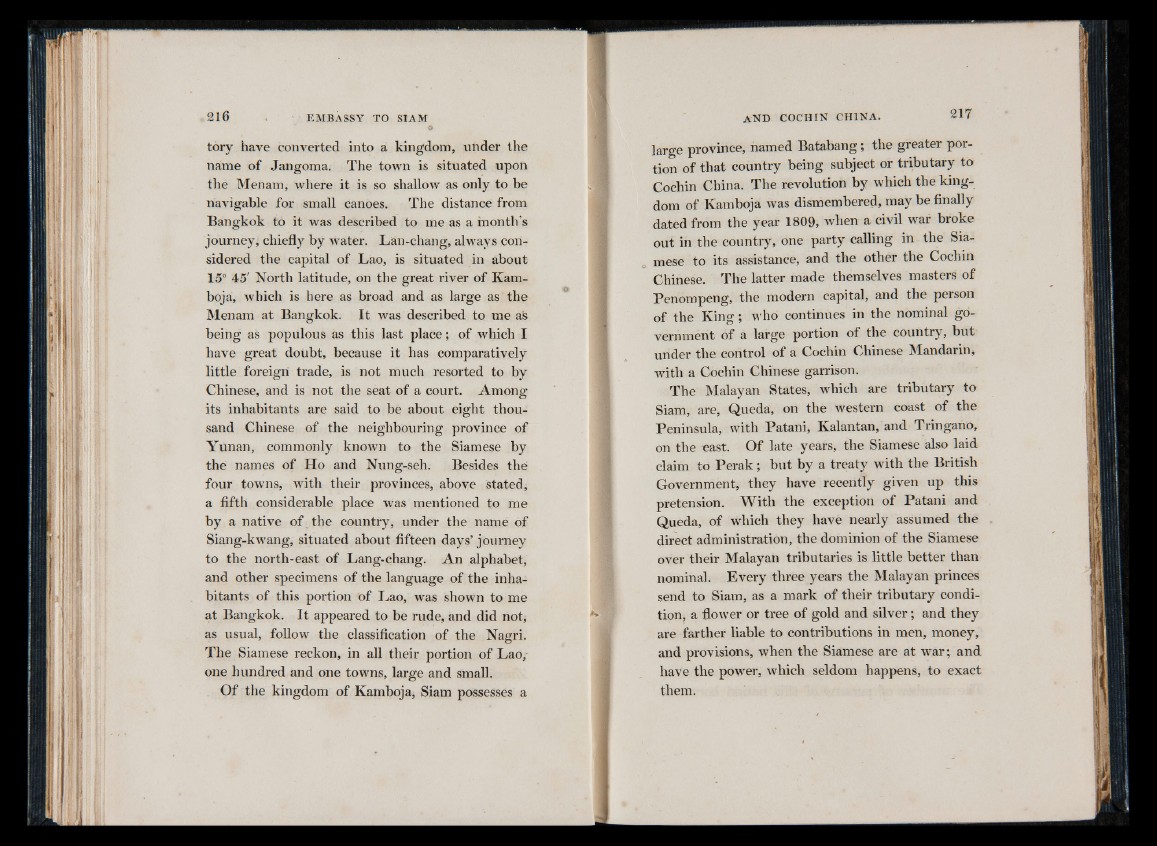
tory have converted into a kingdom, under the
name of Jangoma. The town is situated upon
the Menam, where it is so shallow as only to be
navigable for small canoes. The distance from
Bangkok to it was described to me as a month’s
journey, chiefly by water. Lan-chang, always considered
the capital of Lao, is situated in about
15° 45' North latitude, on the great river of Kam-
boja, which is here as broad and as large as the
Menam at Bangkok. It was described to me as
being as populous as this last place ; of which I
have great doubt, because it has comparatively
little foreign trade, is not much resorted to by
Chinese, and is not the seat of a court. Among
its inhabitants are said to be about eight thousand
Chinese of the neighbouring province of
Yünan, commonly known to the Siamese by
thé names of Ho and Nung-seh. Besides thé
four towns, with their provinces, above stated,
a fifth considerable place was mentioned to me
by a native of the country, under the name of
Siang-kwang, situated about fifteen days’ journey
to the north-east of Lang-chang. An alphabet,
and other specimens of the language of the inhabitants
of this portion of Lao, was shown to me
at Bangkok. It appeared to be rude, and did not,
as usual, follow the classification of the Nagri.
The Siamese reckon, in all their portion of Lao,
one hundred and one towns, large and small.
Of the kingdom of Kamboja, Siam possesses a
large province, named Batabang ; the greater portion
of that country being subject or tributary to
Cochin China. The revolution by which the kingdom
of Kamboja was dismembered, may be finally
dated from the year 1809, when a civil war broke
out in the country, one party calling in the Siamese
to its assistance, and the other the Cochin
Chinese. The latter made themselves masters of
Penompeng, the modern capital, and the person
of the King ; who continues in the nominal government
of a large portion of the country, but
under the control of a Cochin Chinese Mandarin,
with a Cochin Chinese garrison.
The Malayan States, which are tributary to
Siam, are, Queda, on the western coast of the
Peninsula, with Patani, Kalantan, and Tringano,
on the east. Of late years, the Siamese also laid
claim to Perak ; but by a treaty with the British
Government, they have recently given up this
pretension. With the exception of Patani and
Queda, of which they have nearly assumed the
direct administration, the dominion of the Siamese
over their Malayan tributaries is little better than
nominal. Every three years the Malayan princes
send to Siam, as a mark of their tributary condition,
a flower or tree of gold and silver ; and they
are farther liable to contributions in men, money,
and provisions, when the Siamese are at war; and
have the power, which seldom happens, to exact
them.